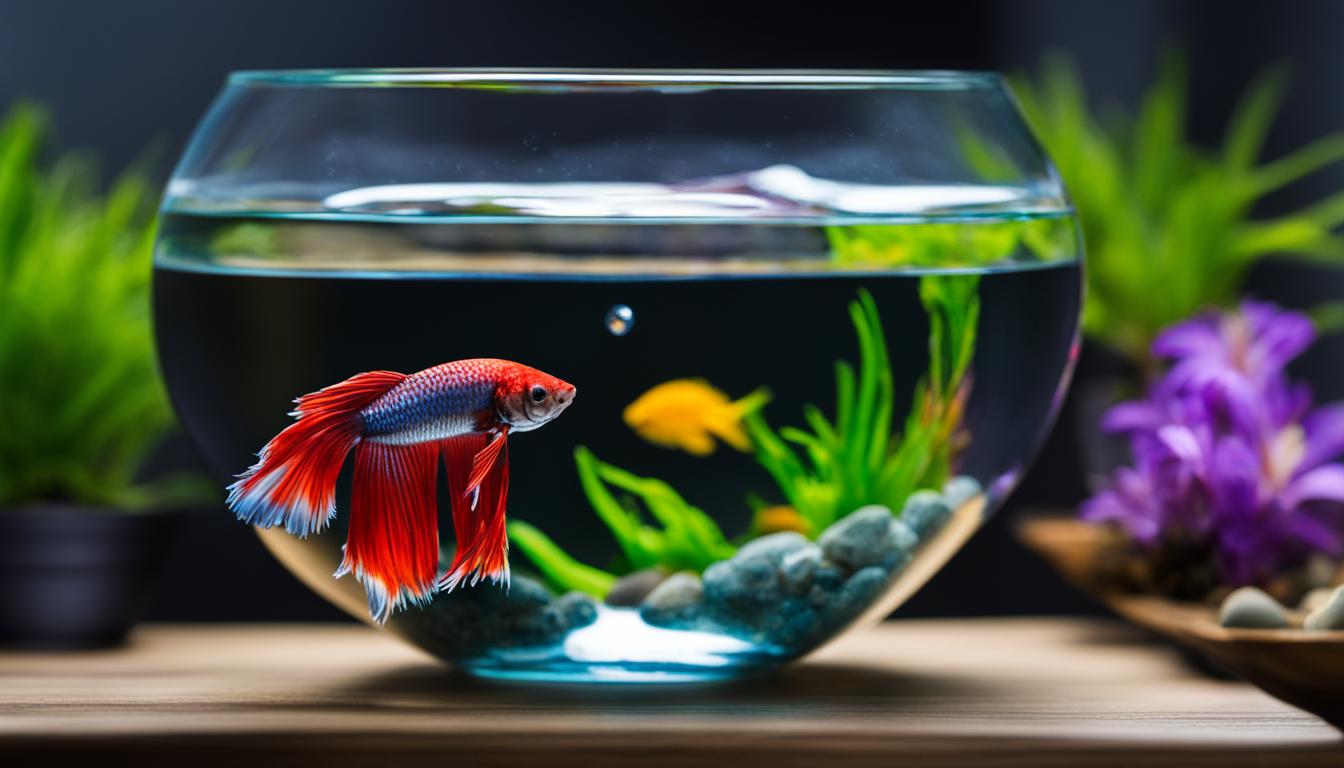Last Updated on 4 months by admin
If you’re a pet owner of a Betta fish, providing them with clean and healthy water is essential for their well-being. While there are various options available, using tap water can be a convenient solution. However, it’s crucial to understand the potential risks involved and take the necessary precautions to ensure your Betta fish’s safety.
In this comprehensive guide, we’ll provide you with all the information you need to know about using tap water for Betta fish care safely. From understanding tap water safety to conditioning and treating tap water, we’ll cover everything you need to know to create a thriving environment for your Betta fish.
Key Takeaways
- Tap water can be a convenient source of water for your Betta fish, but it’s crucial to understand the potential risks involved.
- Conditioning and treating tap water are essential steps to ensure your Betta fish’s safety and well-being.
- Following the necessary steps and precautions when using tap water for your Betta fish can create a clean and healthy environment for them to thrive in.
- Maintaining optimal water conditions is essential for the health and well-being of your Betta fish.
- Avoiding common mistakes and understanding the benefits and drawbacks of using tap water for Betta fish can promote the best care for your pet.
Understanding Tap Water for Betta Fish Care
Tap water is a common source of water for betta fish, but it’s important to understand the potential risks involved. While tap water is generally safe for human consumption, it can contain harmful elements for fish.
Tap water safety for betta fish is essential to ensure the health and well-being of your pet. Chlorine and chloramine are commonly found in tap water and can harm your betta fish if not removed. These substances can cause gill damage, respiratory problems, and even death.
| Chlorine | Chloramine |
|---|---|
| Quickly dissipates when exposed to air | Does not dissipate when exposed to air |
| Easy to remove with a dechlorinator | Requires a special type of dechlorinator or advanced filtration systems to remove |
To ensure the best betta fish care with tap water, it’s important to take the necessary steps to remove these harmful elements from tap water before using it for your fish.
“Chlorine and chloramine are commonly found in tap water and can harm your betta fish if not removed. These substances can cause gill damage, respiratory problems, and even death.”
Conditioning Tap Water for Betta Fish
Tap water is a common source of water for betta fish, but it can contain harmful chemicals and substances such as chlorine, ammonia, and heavy metals that can be dangerous to your fish. These substances can cause stress, illness, and even death in your betta fish if not properly removed.
Conditioning tap water is a crucial step before using it for your betta fish. The process of conditioning tap water involves removing these harmful elements and balancing the pH levels to ensure optimal water quality for your fish.
One way to condition tap water is by using a water conditioner. Water conditioners are specially designed to neutralize the harmful chemicals and substances present in tap water, such as chlorine and heavy metals. They also contain beneficial additives, such as electrolytes and vitamins, that promote the health and well-being of your betta fish.
Another way to condition tap water is through the use of filtration systems. Filtration systems can remove harmful chemicals and substances from tap water while also balancing pH levels. These systems come in various types and sizes, from small filter cartridges to larger canister filters.
Regardless of the method used to condition tap water, it’s important to follow the instructions carefully. Overusing water conditioner or filtration systems can be detrimental to your betta fish’s health and can cause imbalanced pH levels. Make sure to read the labels and use only the recommended amount.
Benefits of Conditioning Tap Water
Conditioning tap water for betta fish has several benefits. It helps remove harmful chemicals and substances, ensuring optimal water quality for your fish. Additionally, conditioning tap water can prevent stress and illness in your betta fish, promoting their overall health and well-being.
By ensuring that the tap water used for your betta fish is safe and suitable for their needs, you can provide them with a clean and healthy environment that promotes their natural behaviors and allows them to thrive.
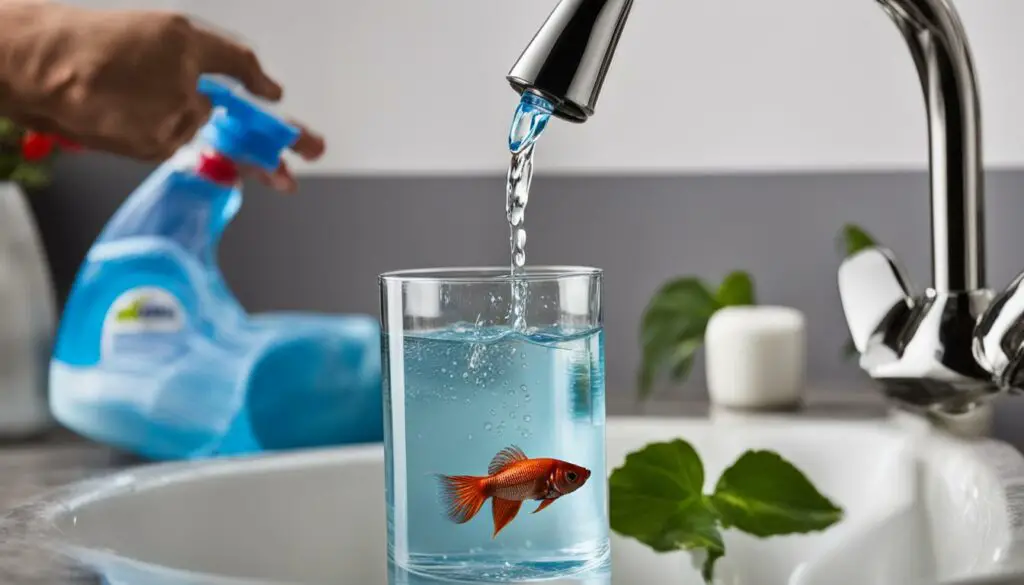
“By ensuring that the tap water used for your betta fish is safe and suitable for their needs, you can provide them with a clean and healthy environment that promotes their natural behaviors and allows them to thrive.”
Overall, conditioning tap water for betta fish is an essential step in ensuring their safety and well-being. By using water conditioners or filtration systems and following the instructions carefully, you can provide your betta fish with optimal water quality that promotes their health and happiness.
Treating Tap Water for Betta Fish
Once you’ve understood the potential risks and safety measures involved in using tap water for betta fish care, it’s crucial to treat the water properly for your fish’s safety and well-being. There are various methods of treating tap water, including:
| Method | Description |
|---|---|
| Water Conditioners | Water conditioners are a popular option for treating tap water for betta fish. They work by removing harmful chemicals such as chlorine and chloramines, which can be fatal to betta fish. Follow the instructions on the label for dosing and wait for the recommended time before adding the water to your fish’s tank. |
| Filtration Systems | A filtration system can remove impurities and harmful elements present in tap water. There are several types of filtration systems available, including activated carbon filters, reverse osmosis systems, and mechanical filters. Each system has its benefits and drawbacks, so do your research and determine which is best for you and your betta fish. |
| Boiling | Boiling tap water can help to remove contaminants and kill harmful bacteria and parasites. However, boiling can also remove beneficial minerals and trace elements that are essential for betta fish health. If you choose to boil tap water, ensure that it has cooled down to room temperature before adding it to your fish’s tank. |
It’s important to note that some treatment methods may not remove all harmful substances from tap water, so it’s essential to perform regular water tests to ensure the quality of the water in your betta fish tank.
Treating Tap Water: Dos and Don’ts
When treating tap water for betta fish, there are some important dos and don’ts to keep in mind:
- Do use a water conditioner or filtration system to ensure tap water is safe for betta fish.
- Do perform regular water tests to ensure the quality of the water in your betta fish tank.
- Don’t use hot tap water, as it may contain higher levels of harmful elements than cold tap water.
- Don’t use distilled or purified water, as it may lack essential minerals and trace elements that are necessary for betta fish health.
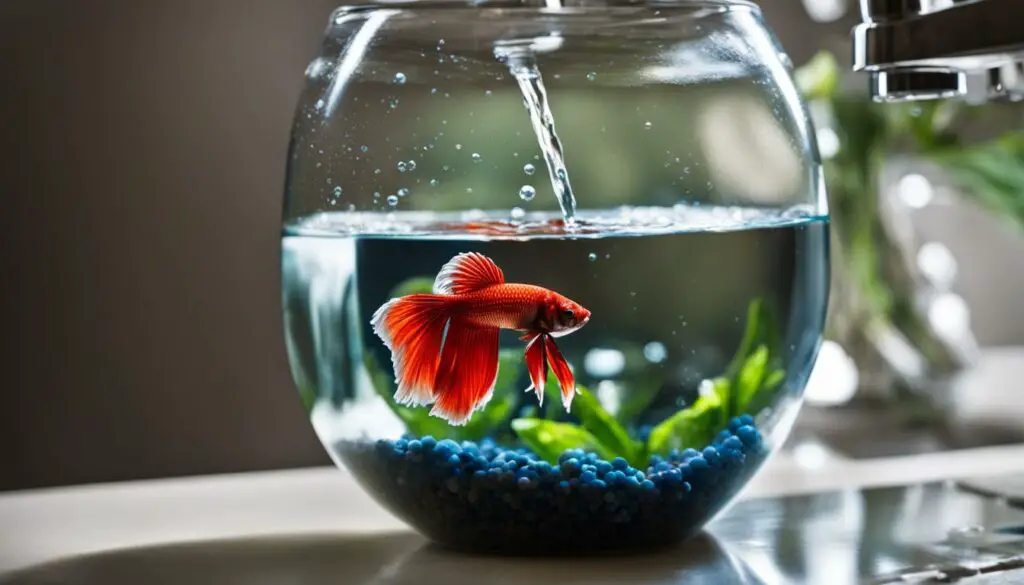
By following the proper steps in treating tap water for betta fish, you can ensure the health and well-being of your pet. Remember to research the various treatment options available and choose the method that is best for you and your betta fish’s needs.
Steps to Using Tap Water for Betta Fish
Once you have conditioned and treated tap water, it’s time to use it for your betta fish. Follow these steps to ensure a smooth transition:
- Take a sample of the conditioned and treated tap water and test it using a water testing kit. This will ensure that the water is safe for your betta fish.
- Slowly add the conditioned and treated tap water into your betta fish’s tank, making sure not to disturb any decorations or plants in the tank.
- Monitor your betta fish closely for the first 24 hours after adding the tap water. Look for any signs of stress or discomfort, such as lethargy or loss of appetite.
- If your betta fish seems healthy and happy after the first 24 hours, you can continue using tap water for their water source.
- Regularly monitor the water quality in your betta fish’s tank and perform water changes as needed. This will ensure that the water remains clean and healthy for your fish.
Using tap water for your betta fish can be a safe and easy option when done correctly. By following these steps and regularly monitoring the water quality, you can provide your betta fish with a healthy and thriving environment.
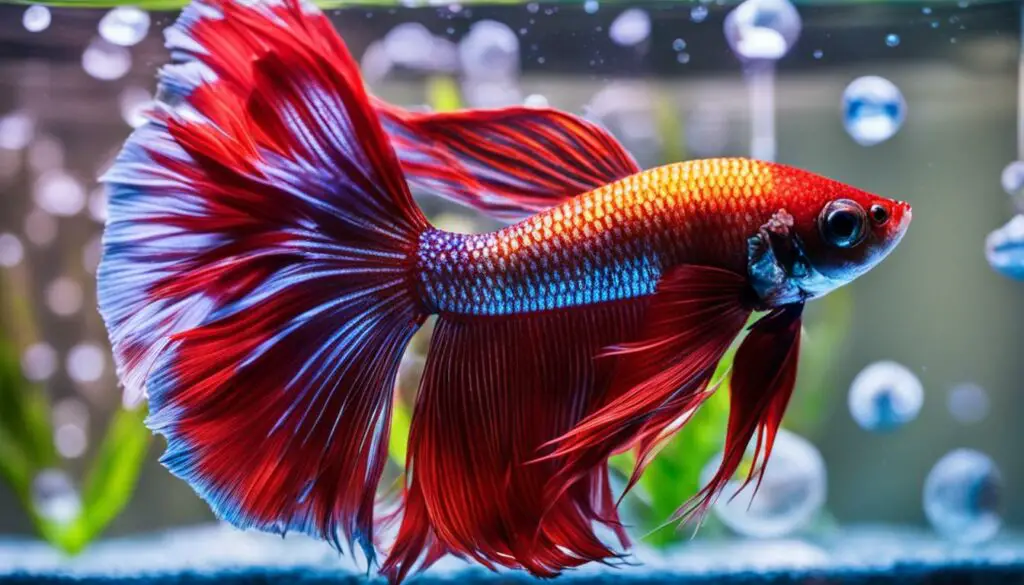
Maintaining Tap Water Quality for Betta Fish
Maintaining the quality of tap water is essential for the health and well-being of your betta fish. Here are some tips and guidelines on how to monitor and maintain optimal water conditions to promote a thriving environment for your fish:
1. Test the Water
Regularly testing your tap water is crucial to ensure that it is safe and healthy for your betta fish. You can use test kits to measure levels of ammonia, nitrites, nitrates, and pH in the water. These levels should be within safe ranges for betta fish. Testing should be done at least once a week.
2. Change the Water
It is important to change the water in your betta fish tank regularly to maintain good water quality. A general rule of thumb is to change 25% of the water once a week. This will help remove excess waste and debris that can build up in the tank. However, be sure not to change all of the water at once as this can be stressful for your betta fish.
3. Keep the Tank Clean
A clean tank is crucial for betta fish health. Regularly cleaning the tank, filter, and decorations will help prevent the buildup of harmful bacteria and other substances in the water. Remove any uneaten food, debris, and waste as soon as possible to maintain water quality.
4. Use a Water Conditioner
Using a water conditioner is essential to make tap water safe for your betta fish. Water conditioner removes harmful chemicals such as chlorine and chloramine from the water. Be sure to follow the instructions on the label and add the correct amount of conditioner to the water.
5. Avoid Overfeeding
Overfeeding your betta fish can lead to excess waste and debris in the tank, which can harm water quality. Feed your betta fish small amounts of food once or twice a day, and remove any uneaten food as soon as possible.
6. Keep an Eye on Behavior
Changes in your betta fish’s behavior can be a sign of poor water quality. If your betta fish is lethargic, not eating, or has a loss of color, it could be a sign of stress from poor water conditions. If you notice any changes in your fish’s behavior, be sure to test the water and take the necessary steps to maintain good water quality.
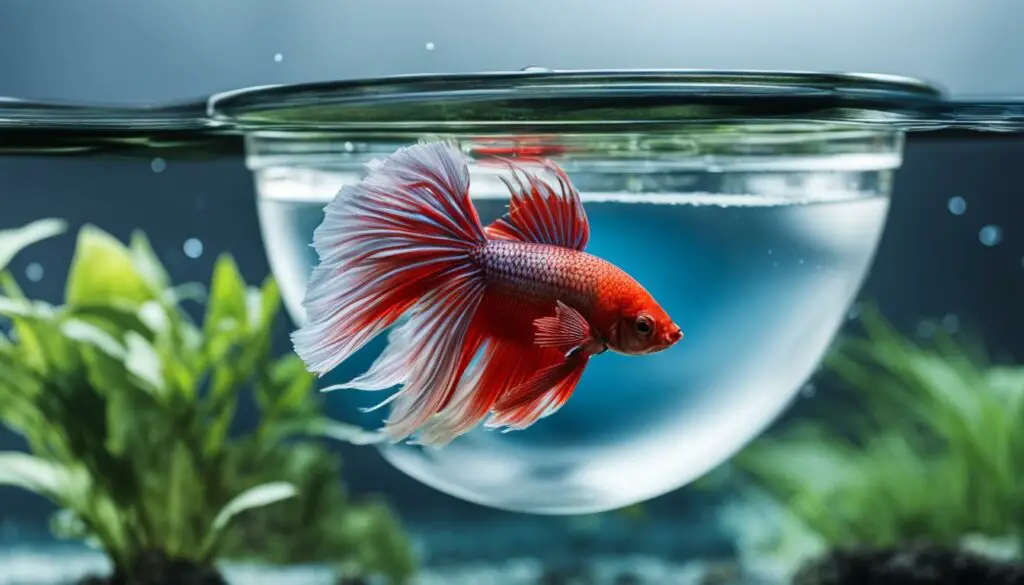
“Maintaining good water quality is essential for the health and well-being of your betta fish.”
By following these guidelines and maintaining good water quality, you can provide your betta fish with a clean and healthy environment. This will promote their well-being and keep them happy and thriving.
Common Mistakes to Avoid with Tap Water and Betta Fish
While tap water can be safe for betta fish when properly used, there are common mistakes that owners make which can endanger their fish. By avoiding these mistakes, you can ensure the health and safety of your betta fish.
Not Conditioning Tap Water
One of the biggest mistakes that betta fish owners make is not conditioning tap water before using it in their fish tank. Tap water can contain harmful chemicals and substances, such as chlorine and heavy metals, that can harm your fish. Conditioning tap water removes these harmful elements and makes it safe for your betta fish.
To condition tap water for betta fish, use a water conditioner that removes chlorine and detoxifies heavy metals. Follow the instructions on the conditioner carefully to ensure proper usage.
Not Treating Tap Water
In addition to conditioning tap water, it’s important to treat it as well. Treating tap water removes any remaining harmful substances and ensures that it’s safe for your betta fish. There are various methods for treating tap water, including using a filtration system, adding beneficial bacteria, or using a chemical water treatment.
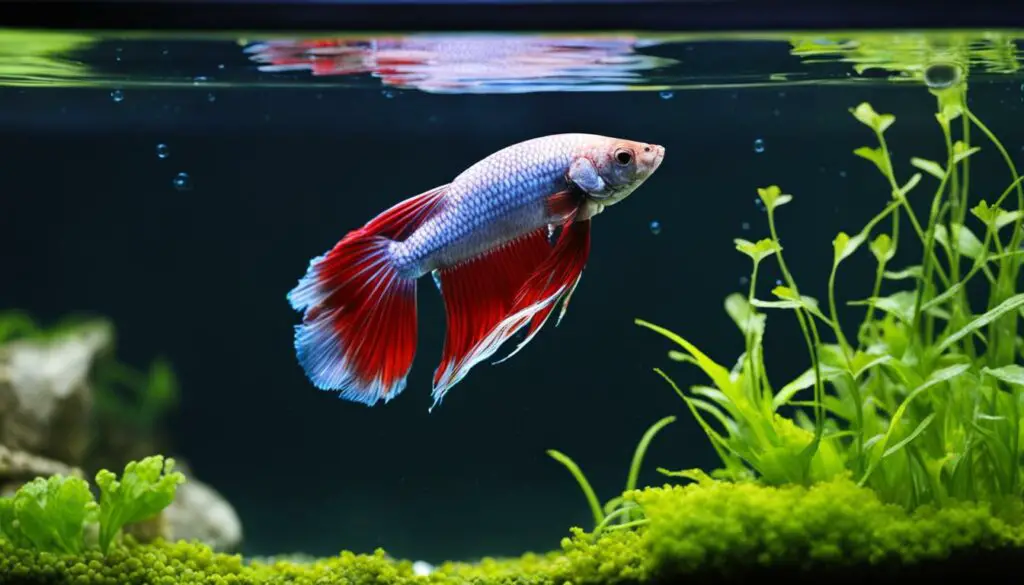
Be sure to research the best treatment option for your specific situation and follow the instructions carefully to avoid any potential harm to your fish.
Not Maintaining Tap Water Quality
Another common mistake that betta fish owners make is not maintaining the quality of their tap water. Poor water quality can lead to illness and even death for your fish. To maintain optimal water quality, test the water regularly for pH, ammonia, nitrite, and nitrate levels and make necessary adjustments. Additionally, perform regular water changes to remove any buildup of harmful substances.
Overfeeding Betta Fish
Overfeeding your betta fish can lead to excess waste and a buildup of harmful substances in the tank. This can result in poor water quality, which can harm your fish. Be sure to feed your betta fish the recommended amount and remove any excess food from the tank to prevent these issues.
Adding Too Many Fish to the Tank
Adding too many fish to your betta fish tank can lead to overcrowding and poor water quality. Bettas are territorial fish and prefer to live alone. If you do decide to add other fish to the tank, research which species are compatible and ensure that the tank is large enough to accommodate them.
Tip: Avoid adding any fish that have long, flowing fins, as betta fish may see them as a threat and attack them. Stick to fish with short fins that won’t trigger your betta fish’s aggression.
By avoiding these common mistakes and following the proper steps for using tap water with betta fish, you can provide your fish with a safe and healthy environment that promotes their well-being.
Benefits and Drawbacks of Using Tap Water for Betta Fish
Using tap water for betta fish care comes with its own set of benefits and drawbacks to consider. In this section, we’ll explore both sides of the equation to help you make an informed decision about using tap water for your betta fish.
Benefits of Using Tap Water for Betta Fish
- Convenience: One of the primary benefits of using tap water is its convenience and accessibility. Unlike other water sources, tap water is readily available in most homes and does not require additional expenses or resources.
- Cost-effective: In addition to its convenience, tap water is generally more cost-effective than other water sources, such as bottled or purified water, which can add up in expenses over time.
- Regulated quality: Tap water is regulated by the Environmental Protection Agency (EPA) and is generally safe for human consumption. This means that tap water is regularly tested and monitored for contaminants, ensuring a certain level of quality and safety.
Drawbacks of Using Tap Water for Betta Fish
While tap water can be a convenient and cost-effective option, there are also some drawbacks to consider when using it for betta fish care.
- Chlorine and other chemicals: Tap water often contains chlorine and other chemicals that can be harmful to betta fish. These substances can damage your fish’s delicate gills and affect their health over time.
- Heavy metals and other contaminants: In addition to chlorine, tap water may also contain heavy metals and other contaminants that can be harmful to your betta fish. These substances can build up in the water and affect your fish’s health and well-being.
- Unpredictable water quality: While tap water is regulated by the EPA, its quality can still vary based on a variety of factors, such as location and season. This can make it difficult to ensure a consistent and safe water source for your betta fish.
When considering using tap water for your betta fish, it’s important to weigh the benefits and drawbacks and take necessary precautions to ensure the safety and well-being of your pet.
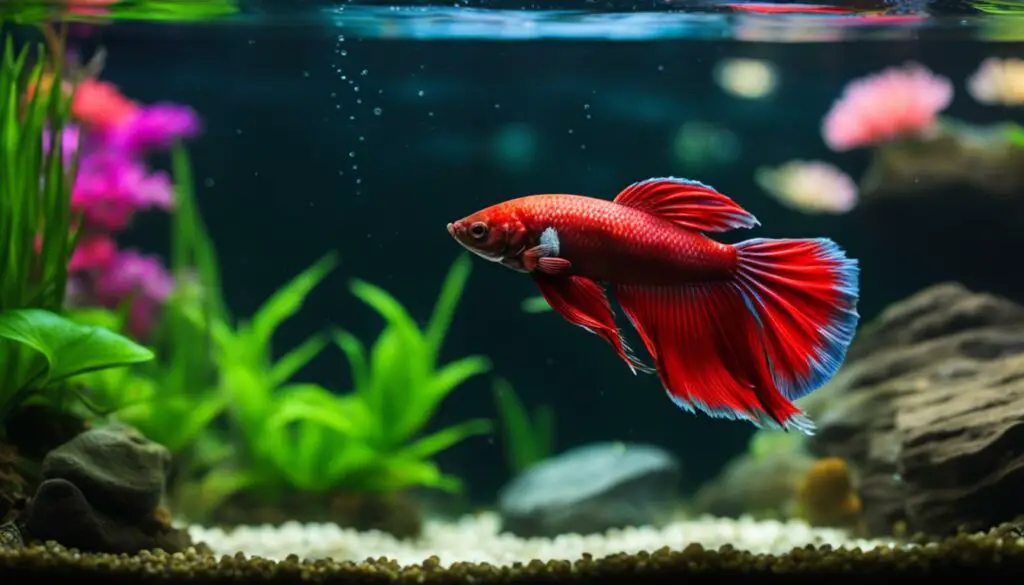
Conclusion
As you can see, using tap water for betta fish care is a safe and suitable option when done correctly. By understanding the importance of tap water safety for betta fish, conditioning and treating the water, and maintaining water quality, you can provide your betta fish with a clean and healthy environment to thrive in.
Always Prioritize Betta Fish Safety and Care
When it comes to caring for your betta fish, it’s essential to prioritize their well-being. This means taking the necessary precautions and steps to ensure their safety, including the use of tap water. Remember to avoid common mistakes, monitor water quality regularly, and seek professional help if needed.
By following the guidelines and tips outlined in this guide, you can provide your betta fish with the care and attention they deserve. Your pet will thank you for your efforts by growing and thriving in their new home, filled with clean and healthy tap water.
FAQ
Can I use tap water directly for my betta fish?
It is not recommended to use tap water directly for betta fish. Tap water may contain harmful chemicals such as chlorine and chloramines that can be harmful to your fish.
How do I make tap water safe for my betta fish?
To make tap water safe for betta fish, you need to condition and treat it. Conditioning removes harmful chemicals, while treating further removes impurities. This ensures the water is safe and suitable for your fish.
What is the process of conditioning tap water for betta fish?
Conditioning tap water involves using a water conditioner specifically designed for fish tanks. The conditioner neutralizes chlorine and chloramines present in tap water, making it safe for your betta fish.
How can I treat tap water for my betta fish?
Treating tap water can be done through various methods such as using water conditioners, using filtration systems to remove impurities, or allowing the water to sit out for a certain period to dissipate chlorine naturally.
What are the steps to using tap water for betta fish?
The steps to using tap water for betta fish include conditioning and treating the water, ensuring it is at the right temperature, and slowly acclimating your fish to the new water. This helps minimize stress and ensures a smooth transition for your betta.
How do I maintain tap water quality for my betta fish?
To maintain tap water quality, regularly monitor the water parameters such as pH and ammonia levels, perform regular water changes, and keep the fish tank clean. This helps create a healthy environment for your betta fish.
What are some common mistakes to avoid with tap water and betta fish?
Common mistakes include using untreated tap water, not properly conditioning the water, not maintaining water parameters, and overfeeding the fish. Avoiding these mistakes helps prevent potential harm to your betta fish.
What are the benefits and drawbacks of using tap water for betta fish?
The benefits of tap water include it being easily accessible and cost-effective. However, the drawbacks include potential chemical contaminants that need to be treated. With proper conditioning and treatment, tap water can be safe for betta fish.

